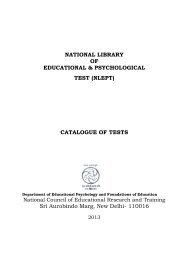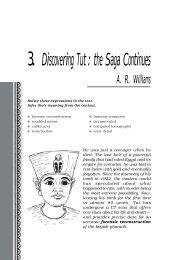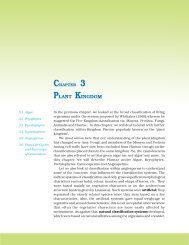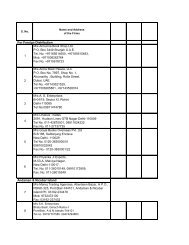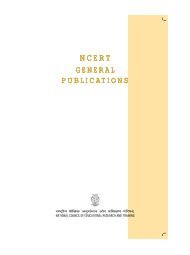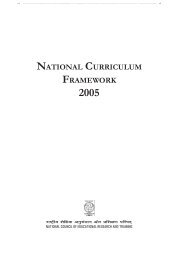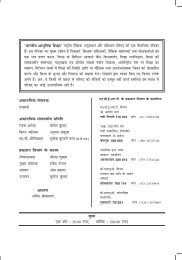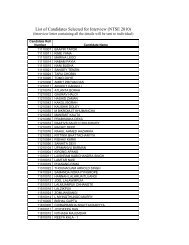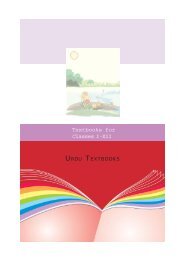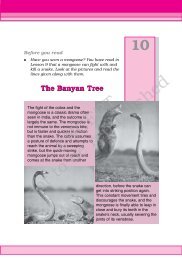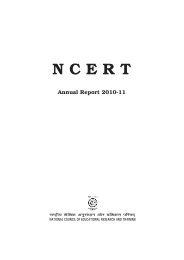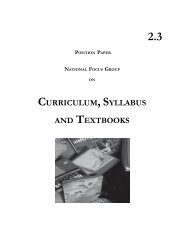indian education - National Council Of Educational Research And ...
indian education - National Council Of Educational Research And ...
indian education - National Council Of Educational Research And ...
Create successful ePaper yourself
Turn your PDF publications into a flip-book with our unique Google optimized e-Paper software.
32 Journal of Indian Education August 2007<br />
culture and its aims, professed and<br />
otherwise’ (Bruner 1996: ix-x).<br />
Bruner’s separating out of what a<br />
culture professes and what it allows in<br />
practice creates spaces for questions,<br />
analysis as well as the liberty to shape<br />
culture. Given the environmental crisis,<br />
<strong>education</strong> will have to create structures<br />
that undo present attitudes to nature<br />
and create a culture that recognises and<br />
honours human dependence on sound<br />
ecological systems. The future of<br />
humanity depends on teaching coming<br />
generations to listen and learn from<br />
nature, on models of growth that are<br />
ecologically sound, on repairing the<br />
damage done by their forefathers to<br />
natural systems. In short, educators<br />
need to acknowledge that a radical<br />
change is necessary and that attitudes<br />
will have to change, cultures liberated<br />
from the violence they implicitly contain.<br />
It is certain that with the onset of<br />
modernity, particular sub-cultures have<br />
to accommodate tenets and norms<br />
beyond those that are an organic part of<br />
their own history. Universal principles,<br />
such as, respect for nature, equal rights<br />
for men and women are examples of these<br />
principles that culture groups are obliged<br />
to uphold. The pertinent questions in<br />
this context remain: whose stories,<br />
whose songs and theatre shall we, in a<br />
complex culture like India’s, teach? <strong>And</strong><br />
what are the cultural practices and<br />
values that need to be unlearned? <strong>And</strong><br />
how is this unlearning to be effected?<br />
Given the vast religious, class and caste<br />
divides in this country, how we in India<br />
understand the word ‘culture’ is neither<br />
easily described and nor universally<br />
acknowledged.<br />
India, with its myriad groups<br />
competing to assert their separate<br />
identities, defies an educator’s<br />
intellectual compass; and so the present<br />
top down formalistic approach that offers<br />
abstractions in the form of national<br />
heroes and modern development<br />
successes in competitive contexts that<br />
reward aggression. The official line that<br />
India stands for ‘unity in diversity’ may<br />
be a truth waiting to be born, if we educate<br />
our children to stand together in solidarity<br />
for purposes that serve universal<br />
interests while preserving differences.<br />
Human societies can come together<br />
to solve global problems of species<br />
depletion, soil erosion, air and water<br />
pollution, and rebuild their relationship<br />
to nature, if knowledge is united with<br />
values aimed at restoring ecosystems<br />
back to health and the task of <strong>education</strong><br />
then is not only to design curricula that<br />
are Earth centred but also to teach<br />
students how to unlearn habits and<br />
worldviews born of greed and aggression.<br />
My plan is to investigate these<br />
connected issues in two parts – I will first<br />
describe an <strong>education</strong>al project in the<br />
interior of south India, guided by the<br />
philosophy of Jiddu Krishnamurti. The<br />
attempt here will be to illustrate the<br />
manner in which one school has<br />
promoted a culture of peace by applying<br />
the philosophy of its founder to address<br />
the complex issues of poverty and<br />
ecological degradation that face the local<br />
population. The second section will<br />
contain an exposition of Krishnamurti’s<br />
<strong>education</strong>al philosophy. I will present him<br />
as a deep ecologist who explored the<br />
nature of intelligence and human<br />
interactions based on this intelligence.



